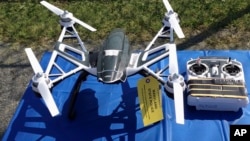Wily inmates and their associates on the outside are deploying drones to deliver drugs, cellphones, and other contraband to prison yards, leaving prison guards and correctional authorities scratching their heads over how to deal with the new technology.
After smuggling incidents around Maryland, Ohio and Oklahoma prisons last year, Illinois lawmakers are proposing legislation to penalize the activity, even though the state has yet to see an incident on its own turf. Wisconsin and Michigan also have pending legislation to criminalize the use of drones over prisons.
In one of those first incidents, a drone delivering drugs last July to a prison in Mansfield, Ohio, triggered a fight among inmates when the package with heroin, marijuana, and tobacco was dropped in the yard.
"It's like anything, new technology brings new problems," said Sen. Tim Bivins, a Republican sponsoring the Illinois legislation. Bivins' bill would add an extra year of prison to inmates involved in bringing contraband into prison with a drone.
The idea for the Illinois measure came from the state's Department of Corrections. While drones haven't been a problem yet, the department "is taking a proactive approach to ensure it does not" become one, said spokeswoman Nicole Wilson.
In Maryland last August near the prison in Cumberland, police said they arrested two men planning to use a drone to drop off drugs, pornography, and a cellphone into the facility. And last October, prison officials at the Oklahoma State Penitentiary found a drone that crashed on facility grounds with hacksaw blades, a cellphone, and heroin.
Knowingly taking aerial images of a correctional institution would also be punishable with a felony charge under Bivins' bill. That's because in addition to being worried about smuggling contraband, officials also are concerned that drones could be used to plan escapes or other crimes by capturing videos or photographs of a prison's layout.
"You shouldn't have the ability to fly over a prison whether you're dropping contraband or not," said Bivins, of Dixon, Illinois, home to a medium security prison with about 2,300 inmates. He said while it may be possible to charge someone caught flying drones over prisons currently, it would be only a misdemeanor offense like disorderly conduct and prison officials wanted to have something in the books specifically on drones.
Tennessee is the only state with a law specifically relating to the use of drones over prisons, according to the National Conference of State Legislatures. Under the proposed Wisconsin legislation, anyone who flies a drone over a state correctional institution would face a fine up to $5,000.
But states are trying to address the issue without legislation, too.
South Carolina's Lee Correctional Institution in Bishopville got new surveillance equipment installed in December 2014 after someone tried to smuggle contraband with a drone.
Ohio correctional officials are also trying to figure out how to prevent more drone-smuggling cases like the one that sparked the prison-yard fight last year.
Brian Niceswanger, a spokesman for the Ohio Department of Corrections, said officials explored the possibility of using technology that blocks the radio waves that control the drones. But they worried that could impact cell reception at the prison and in nearby neighborhoods.
For now, Niceswanger said they're still trying to determine what to do about drones.
"We're not going to allow anyone to try to shoot them down or anything like that," he said. "We're trying to explore what options there are to combat them other than increasing the penalties for those who try to fly them in."








